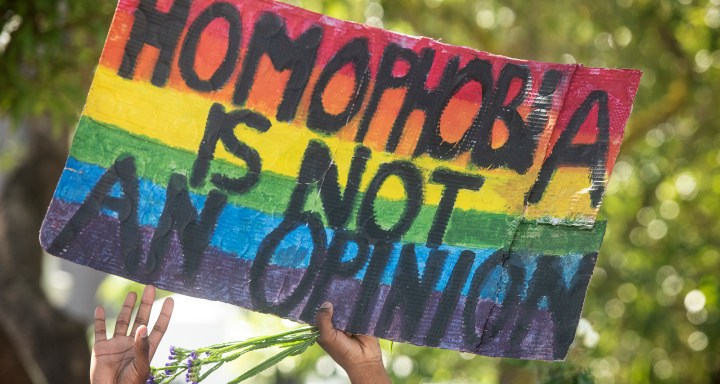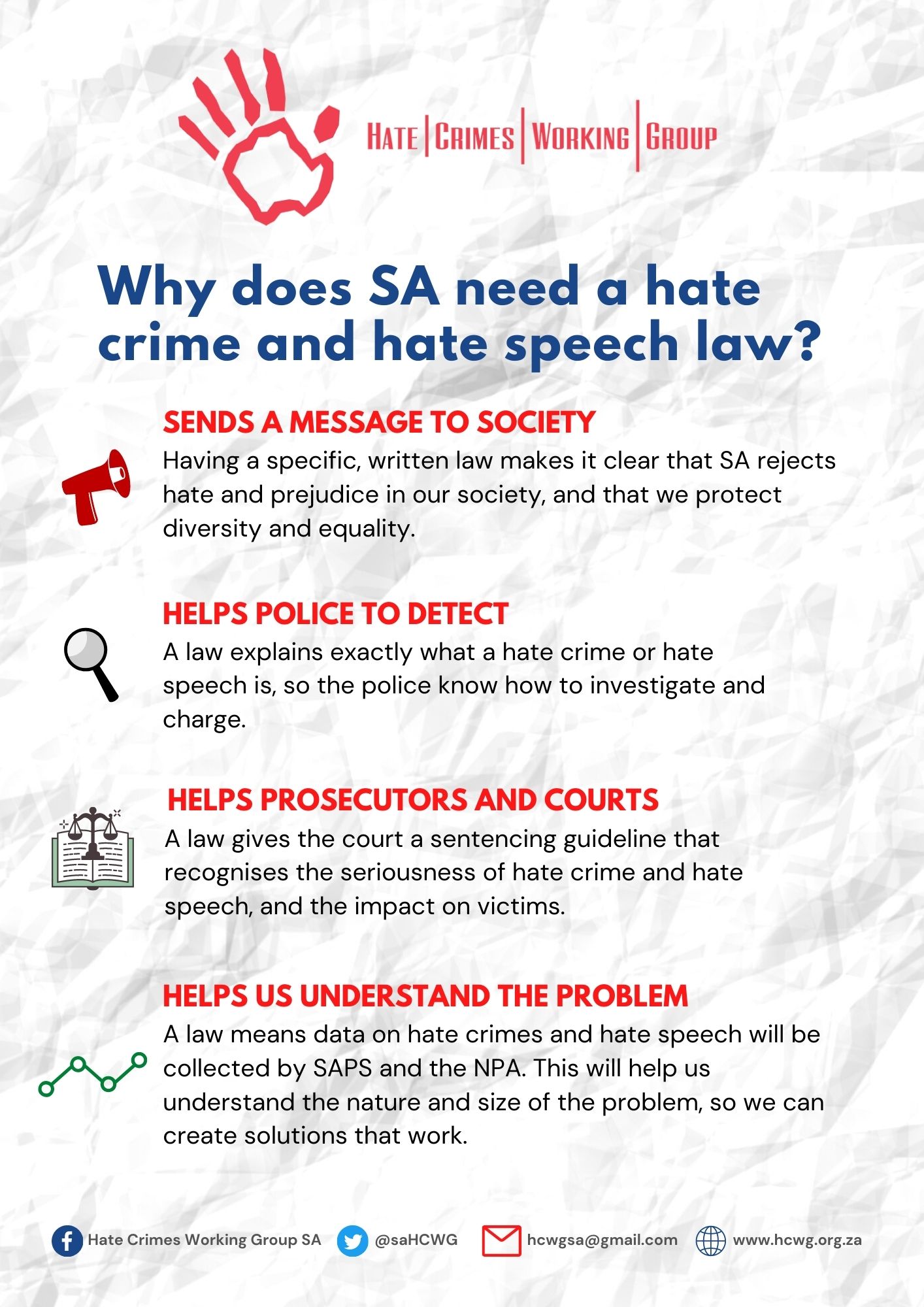'ABSOLUTELY CRUCIAL'
Parliament holds first public hearings on hate crimes and speech bill

Nearly four years after the introduction of the Prevention and Combating of Hate Crimes and Hate Speech Bill into Parliament in April 2018, Parliament held the first public hearings on the bill on Tuesday.
‘There’s a genocide against LGBTQI+ people in this country, and it’s critical to have legislation that will really harness the fact that these crimes are motive- and message-driven,” the deputy chair of the Hate Crimes Working Group (HCWG), Thozama Njobe, told Daily Maverick following the HCWG’s presentation to Parliament on Tuesday.
The HCWG — a coalition of civil society organisations aimed at spearheading advocacy and reform initiatives pertaining to hate crimes in South Africa — was one of several organisations that briefed Parliament’s Portfolio Committee on Justice and Correctional Services on the Prevention and Combating of Hate Crimes and Hate Speech Bill.
The bill was introduced in Parliament four years ago, in April 2018. Parliament’s previous Portfolio Committee on Justice and Correctional Services called for public comment, and many organisations and individuals submitted comments, including the HCWG.
The portfolio committee chairperson, Bulelani Magwanishe, had previously said the committee had intended to hold public hearings after the initial closing date, but due to its heavy workload and the onset of the 2019 national elections, this failed to happen, and the bill lapsed at the end of the fifth Parliament, News24 reported.
The bill was revived in October 2019 and was put out for public comment again in August last year. However, it wasn’t until Tuesday that the first public hearings on the bill were held.
This was when Parliament’s Portfolio Committee on Justice and Correctional Services heard presentations from Freedom of Religion South Africa, the South African Jewish Board of Deputies, the Hate Crimes Working Group, the Restorative Justice Centre, Southern African Catholic Bishops’ Conference, the Institute of Race Relations, Accountability Lab South Africa and Access Chapter 2.
Fourteen babies and toddlers have starved to death in Nelson Mandela Bay in the past 15 months
The implementation of the bill is “absolutely crucial”, and will give LGBTQI+ people “a form of recourse and recognition”, Njobe told Daily Maverick.
“It will allow the crimes perpetrated towards LGBTQI+ people to be comprehensively prosecuted, because these crimes often result in murder. Very often these victims don’t have the ability to speak for themselves,” said Njobe.
Njobe explained that the HCWG presented that components of the bill – for example, in sentencing and pre-sentencing – should allow associates of an LGBTQI+ person, including friends, colleagues and organisations that specialise in LGBTQI+ issues, to represent, during the sentencing of the perpetrator, the person who has been murdered, “in order for these crimes to be prosecuted in an effective way that combats and prevents hate crimes towards LGBTQI+ people”. *
In 2021, the HCWG conducted a study that found that between January and September more than 50 hate crimes had been perpetrated against LGBTQI+ people in South Africa, said Njobe.
Read in Daily Maverick: Bodies pile up as the hate crimes bill gathers dust in Parliament
Another reason why South Africa urgently needs a hate crimes and hate speech law, according to the coordinator of the HCWG, Sanja Bornman, is because South Africa currently does not have a crime category for hate crimes.
“When SAPS reports crime statistics every quarter, they’re not telling us anything about hate crime,” said Bornman.
Read in Daily Maverick: Murder remains ‘worryingly stubborn’ even as other contact crime categories see decreases in incidents — Minister Bheki Cele
Once implemented, the HCWG hopes that the law will:
- Send a strong message that hate and prejudice are unacceptable in our society;
- Assist the police and prosecutors in investigating, charging and prosecuting hate crimes and hate speech;
- Give courts meaningful sentencing guidelines; and
- Allow for the effective recording of statistics, so we can better understand the nature of the problem and create successful interventions.

While the HCWG welcomed the bill, it did, however, raise concerns about several weaknesses in the draft law during its presentation, which focused primarily on the hate crimes component of the bill.
“Among these are what the HCWG has identified as weak provisions for the prevention of hate crime and hate speech, and the lack of a costing of the bill — which the Department of Justice and Correctional Services has unconvincingly said can be implemented without any additional funding, using existing departmental budgets.”
Today we go to Parliament! ✊️ #HateCrime #HateSpeech pic.twitter.com/1rPmt6ADex
— HateCrimesWorkingGr (@saHCWG) March 29, 2022
The chair of the HCWG, Sibusiso Khasa, told the committee that the group was deeply concerned about the lack of a costing accompanying the bill’s explanatory memorandum.
“We note that while various versions of the bill have been available since 2016, the bill remains uncosted,” said Khasa.
“We strongly contest the assertion in the explanatory memorandum to the bill, that the complicated work of preventing and combating hate crimes and hate speech can be done within existing departmental budgets.”
The bill’s explanatory memorandum states that the bill will be implemented using existing resources and funds within the department. However, without a costing accompanying the memorandum, such an assertion can’t be verified, said Khasa.
“[The bill] will be impossible to implement without the substantial commitment of resources,” said Khasa.
In addition to the apparent lack of accountability regarding costing, Khasa and Bornman spoke briefly about the inclusion of hate speech in the bill — a provision which some organisations, such as Freedom of Religion South Africa, argued should be “omitted altogether” unless the definitions of both “harm” and “hate speech” are completely revised.
“The HCWG has in the past had difficulty with its inclusion because we’ve been concerned that the controversial nature of the provisions would delay the promulgation of the hate crimes division, which we are all very anxious about, as it is very clear that hate crime is a very serious problem,” said Bornman.
“In addition to that, the members of the HCWG do believe that hate speech and hate crime are very closely linked, and that hate speech very often turns into hate crime, and so while we are still concerned that the inclusion of hate speech will delay the promulgation of the bill — because it is controversial — we are anxious for the hate crimes provisions to be passed and so accept its inclusion,” she added.
Out of eight presentations to Parliament on Tuesday, only one organisation — the Institute of Race Relations (IRR) — argued that the department should “abandon the bill in its entirety”, saying that “race relations are generally sound” in South Africa.
“The hate speech clauses are unconstitutional, while the hate crime ones are confusing and inconsistent with the rule of law. Neither the hate speech nor hate crime clauses are necessary,” said Dr Anthea Jeffery, who gave the IRR’s presentation to Parliament. DM
* An amendment was made to this article following initial publication, for accuracy.
[hearken id=”daily-maverick/9303″]

















What a silly waste of time and effort. One cannot expect law enforcement to police thoughts and emotions. Hatred is an emotion. There is not such thing as a “hate crime”. There is only crime. This lunacy will only serve to muddy the waters of a judicial system that is already struggling under the weight of nation-wide corruption and government overreach.
It really does seem like certain special interest groups are hell-bent on creating “rules for thee but not for me” under an umbrella of assumed victimhood. This directly undermines the principle of equality before the law and I find it contemptible.